Non-packaging-plastics – Meltblown 13-12-2022 - Arhive
Non-packaging plastics – Meltblown
Crude Oil Prices Trend
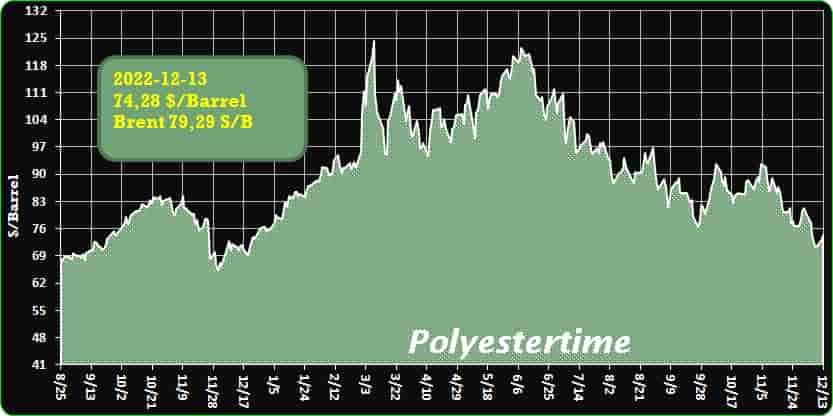
Crude Oil Prices Trend
-Amcor increases use of advanced recycling materials leveraging ExxonMobil’s Exxtend™ technology
New technology will result in more sustainable flexible polyethylene packaging
Amcor , a global leader in developing and producing responsible packaging solutions, today announced it is the first company to purchase certified circular polyethylene material using ExxonMobil’s Exxtend™ technology for advanced recycling. Amcor will leverage this new material across its global portfolio, providing customers in healthcare and food industries with circular content in a variety of solutions and applications.
Increasing the use of advanced recycling materials, such as circular polymers, is one way Amcor is meeting its sustainability pledge to develop all of its packaging to be recyclable or reusable by 2025 and increase the use of recycled content. The use of these materials will significantly add to the 113,000 metric tons of recycled material Amcor used in its packaging in fiscal year 2021. Non-packaging plastics – Meltblown
The technology behind advanced recycling materials allows plastic waste to be converted into brand new products that are no different in quality and performance from ones made with virgin raw materials, providing customers peace of mind and the benefit of increasing the use of circular content in their packaging.
“Using advanced recycled materials is yet another step forward in Amcor meeting the challenges of our industry and offering our customers more sustainable packaging solutions,” said Amcor Chief Commercial Officer Peter Konieczny. “By leveraging ExxonMobil’s Exxtend technology across our global product portfolio, Amcor is providing a true differentiator for our customers and the environment.”
“We are proud to see our relationship with Amcor expand with our Exxtend technology to help address their sustainability goals, as well as those of their customers,” said David Hergenrether, Vice President, Polyethylene, ExxonMobil.
“We look forward to working closely with Amcor to develop products that meet customer expectations for high-performance PE products, while helping to recycle plastic waste.”
Using its Exxtend technology, ExxonMobil offers certified circular polymers with the International Sustainability and Carbon Certification Plus (ISCC PLUS) certification, which is widely recognized as an effective standard for certifying the circularity of chemical products that result from advanced recycling operations via mass balance attribution.
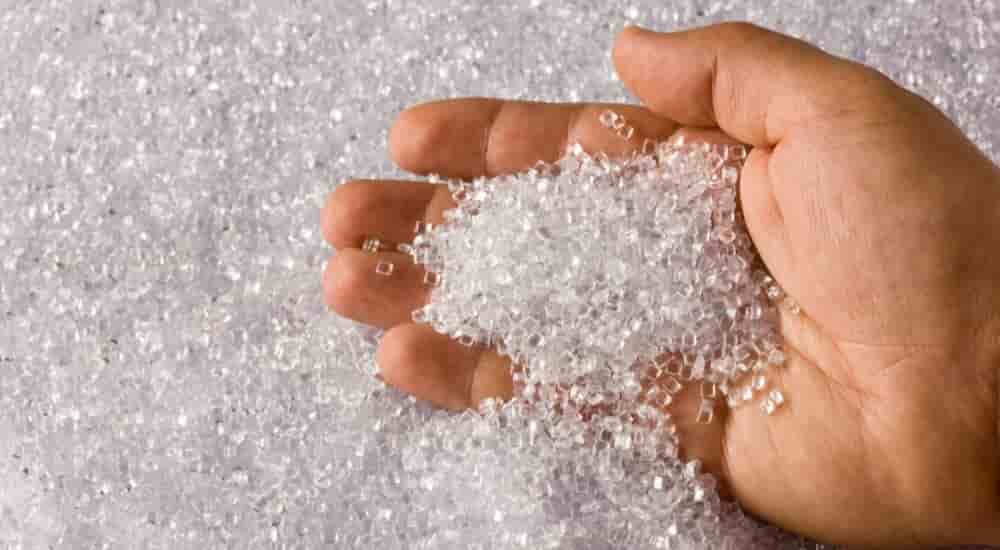
-First round of plastic treaty talks ends with little decided
Next sessions must bridge split between high and low-ambition countries
The first of a planned five sessions of the Intergovernmental Negotiating Committee – the United Nations body tasked with developing the first legally binding global treaty on plastic pollution – drew over 2,500 in-person and virtual delegates from 28 Nov – 2 Dec from 147 countries.
This first round of negotiations, known as INC-1, comes nine months after representatives from 175 countries endorsed a resolution on plastic pollution at the United Nations Environment Assembly, after which the UN Environment Programme was tasked with convening and managing the INC process.
In advance, the INC secretariat had determined that the relevant issues fell into four main areas: eliminating and substituting unnecessary plastic and hazardous additives, designing plastic products to be reused and recycled, ensuring products are reused and recycled, and managing plastic pollution in an environmentally responsible manner.
Inger Andersen, Executive Director of the UN Environment Programme (UNEP) said at the opening of the session in Punta del Este, Uruguay, that it was ‘important that we find our way towards an ambitious multilateral instrument that ensures plastic products are circulated in practice, not just in theory’. Non-packaging plastics – Meltblown
While there was no disagreement about the importance of developing such an instrument, considerable differences emerged elsewhere, such as whether the future treaty should be based on national action plans or global, mandatory targets.
Several delegates indicated the instrument should take a combined approach with legally binding core obligations, control measures and voluntary elements to address the entire plastics lifecycle. Furthermore, many delegates emphasised the need to ensure strong monitoring and reporting mechanisms as part of the success of the future instrument.
However, as one of the delegates, Dr Alexandra R Harrington, Chair of the IUCN World Commission on Environmental Law Agreement on Plastic Pollution Task Force, later noted that clear distinctions emerged regarding the Treaty’s structure, the contents and requirements of proposed National Action Plans, the need to focus on various aspects of the plastics lifecycle as a first priority, and how scientific and technical elements are to be merged into the legal and policy elements of the Treaty.
There were no policy-based decisions regarding the contents of the Treaty at the end of INC-1. In fact, said Peter Hjemdahl, co-founder and Chief Advocacy Officer at rePurpose Global, who also attended the meeting, the first round of negotiations ‘saw plenty of narratives and demands being lobbed in every direction, but not a whole lot of solutions.’
“Out of the 1000+ delegates who attended the meeting, there were hundreds of advocacy groups present, ranging from WWF to the petrochemical industry, but barely a handful of delegates that represented innovative solutions against the plastic waste crisis.”
He added: “A big driver behind this lacklustre representation of innovators is the extremely restrictive delegate badging and approval process that biases well-connected, long-standing organisations over newly created ones, and unless this gets fixed for the next set of meetings, the global plastic treaty can risk becoming a piece of text that sounds good on paper but doesn’t empower actual solutions on the ground.”
The next session, INC-2, will be held in Paris, France in the week of 22 May 2023, during which, it is expected, the delegates will build on the outcomes of this first meeting in Punta del Este, Uruguay. Non-packaging plastics – Meltblown
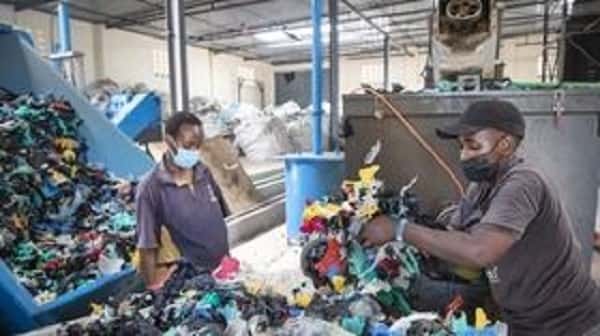
-Most plastic consumption in Europe lacks direct policy targets and data
Plastics are used across Europe in everything from construction materials to consumer products. Recent policy actions on plastic packaging at EU and national level have established collection schemes and introduced waste prevention measures. However, according to a European Environment Agency (EEA) briefing, published today, a significant fraction of Europe’s total plastic consumption is outside this policy focus and at risk of being overlooked in Europe’s transformation towards a more circular economy.
The EEA briefing ‘Managing non-packaging plastics in European waste streams’ provides an overview of the consumption and management of those plastics that do not fall under the category of packaging. To date, these materials have not been prioritised for action through specific EU directives and policy. Non-packaging plastics – Meltblown
Non-packaging plastics include diverse materials in products ranging from buildings and vehicles to everyday items, such as electronics, sports equipment, diapers and toothbrushes. The EEA briefing notes that currently there are no direct recycling or re-use targets for these materials, which may account for up to 74% of the EU’s total plastic consumption, according to recent estimates.
There is currently insufficient knowledge about the overall level of plastic consumption and plastic waste generation in Europe. Some data are available from Europe’s plastic industry but they do not include the plastics that are part of imported goods. According to the EEA briefing, there is a high value in developing a more standardised methodology for tracking non-packaging plastic flows in the EU. This would allow for effective monitoring of the total amount of plastic waste and provide improved evidence to inform policy and investment decisions.
“Non-packaging plastics account for up to 74% of the EU’s total plastic consumption”.
Key EU policy instruments in the area include the Circular Economy Action Plan and the European Strategy for Plastics in a Circular Economy. The recent Circular Economy II package proposed by the European Commission also includes initiatives on packaging and on bio-based, compostable and biodegradable plastics.
In addition, there will be a need to also address plastic used in non-packaging applications through potential future measures such as introducing extended producer responsibility schemes, material-specific recycling targets and reporting obligations.
Such aspects will need to be addressed if Europe is to better manage total plastic flows in the context of transformation to a circular economy, the EEA briefing concludes.

-Oil companies move to plastic recycling as Korean gov’t pushes for green
With environmental bans pressuring the oil and petrochemicals industry to move away from traditional fossil fuels, companies are eyeing a breakthrough in plastic recycling.
Korea’s major oil refiners and petrochemicals companies — including SK Innovation, GS Caltex, Lotte Chemical and LG Chem — have started coming forward since last year with multimillion or even billion-dollar plans to enter the plastic recycling business, with combined investments of roughly over 2.2 trillion won ($1.7 billion) over the next two or three years. Non-packaging plastics – Meltblown
SK Innovation plans to build a 215,000-square-meter (2.31 million-square-foot) plastic recycling factory at its Ulsan refinery. The facility will have an annual processing capacity of 250,000 tons.
A total of 1.7 trillion won will be put into the project, which will be underway from September 2023 to 2025.
In late November, GS Caltex announced a 113-billion-won investment by 2024 to build a chemical recycling facility with an annual capacity of 50,000 tons and an aim to increase the production capacity to 1 million tons.
LG Chem also said in November that it is constructing a 310-billion-won chemical recycling plant in Dangjin, South Chungcheong, which is scheduled to be completed by 2024.
Lotte Chemical is investing 100 billion won to build a chemical recycling facility by 2024, with a capacity of 110,000 tons a year. Hyundai Chemical, a 60-40 joint venture between Hyundai Oilbank and Lotte Chemical, built a new petrochemical plant with a chemical recycling capacity of 30,000 tons, and is considering expanding that to 100,000 tons.
Local manufacturers are focusing on the chemical recycling of plastic waste.
Unlike mechanical recycling, which is applicable to only limited types of plastics, chemical recycling changes the chemical structure of plastic waste, and therefore can be applied to a wider variety of plastics while maintaining the product quality.
Yet its high cost is the biggest barrier to entering the chemical recycling business, as achieving economy of scale and securing advanced technologies are the preconditions to make the math work.
“Demand is certainly there, and will only grow in time, though whether the companies will be able to make ends meet with the business may be a different matter.” said an oil refining industry insider, who wished to remain anonymous.
For the chemical recycling business to “make economic sense,” a processing capacity of about 100,000 tons is needed, according to IHS Markit data quoted in the Financial Times’s March report.
Chemical recycling also has a bigger environmental impact than mechanical recycling at its current point, and the technology and infrastructure are still in their infancy in Korea.
“Considering the lack of the economy of scale and the energy costs, the profitability of chemical recycling is still low,” said Lee Eun-young, director at Samil PwC, an accounting and consulting firm. Non-packaging plastics – Meltblown
But Lee added that “the market is ex pected to grow in the future, backed by the government policy and technological support.”
Chemical recycling is considered “crucial in realizing the circular economy” due to its versatility.
“About 70 percent of discarded plastic waste cannot be mechanically recycled due to contamination, mixed raw materials, colorant and other reasons,” said Wee Jung-won, analyst at Kyobo Securities.
“Overall, about 18.9 percent of total plastic waste is actually being recycled. That is why chemical recycling, which can make a wider variety of plastic waste recyclable, is urgently needed.”
The local government is also eagerly promoting chemical recycling. The target is to bump up the chemical recycling rate from 2020’s 0.1 percent to 10 percent by 2030.
One of the major push factors is the strengthening of regulations on plastic waste worldwide.
Starting January 2021, the European Union began to impose a tax of 0.8 euros ($0.8) per kilogram of non-recycled plastic packaging waste. Europe aims to recycle 50 percent of its plastic packaging by 2025, and 55 percent by 2030. Starting in 2030, European plastic makers will be required to use at least 30 percent recycled content in their products as well.
Plastic was Korea’s tenth-largest export item to the European region in 2020, with an annual export volume of $1.3 billion.
Moreover, as China prohibited the import of most plastic waste in 2017, countries that have been exporting their plastic waste to China scrambled to strengthen environmental regulations while promoting resource recycling. Non-packaging plastics – Meltblown
Amid this global transition, big names in the fossil fuel industry such as Germany’s BASF and Saudi Arabia’s Sabic have been diversifying their business portfolio into chemical recycling, and Korean companies are following suit.
“Due to the latest crude price hikes and stronger environmental regulations, the issue of profitability, which has been the biggest obstacle to chemical recycling so far, was solved,” according to an IBK Securities report published on Oct. 31.
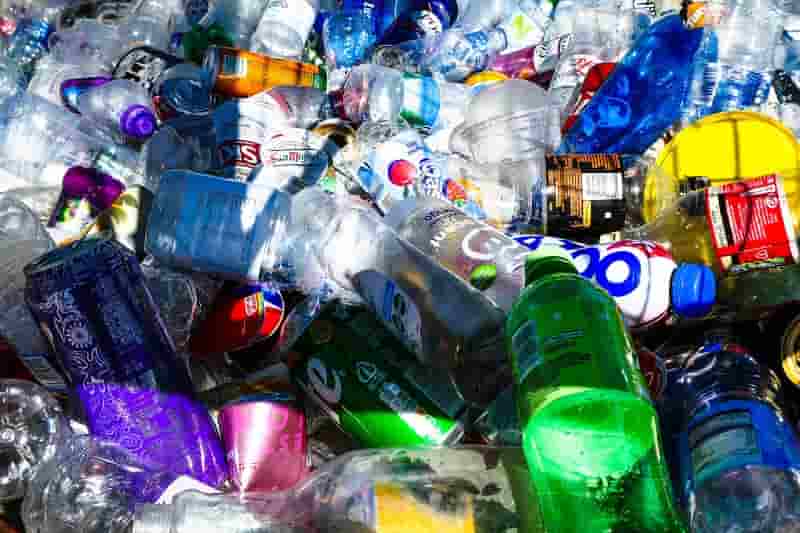
-Rohm buys PC-based SABIC films and sheets
Roehm, a major European producer of methyl methacrylate (MMA), will acquire production of SABIC polycarbonate films and sheets in the first half of 2024, Roehm said in a press release.
The agreement does not apply to SABIC’s polycarbonate (PC) extrusion business, but includes the Functional Forms division, which offers a wide range of polycarbonate (PC) films and sheets, primarily sold under the LEXAN brand name.
Roehm is a well-known manufacturer of polymethyl methacrylate (PMMA) products, sold in most regions under the registered trademark PLEXIGLAS, and in the Americas as ACRYLITE.
“By adding the polycarbonate resin extrusion business to our portfolio, we will steadily strengthen our competitiveness in our sheets and films business,” said Roehm CEO Dr Michael Park. Non-packaging plastics – Meltblown
This type of polycarbonate-based sheets and films is used in a wide variety of industries: from construction to consumer electronics, medicine and aviation.
The new combined business will have 14 production sites worldwide and sales of more than 700 million euros, the company said in a press release. The purchase price was not disclosed.
The agreement is subject to consultations with the relevant works councils, which should be completed “in the coming months”, and the approval of the antimonopoly authorities.
The deal is expected to close in the first half of 2024 and will include the sale of Roehm’s SABIC Functional Forms production sites worldwide, a company spokesperson said.
The European sheet PC sector has struggled in recent months due to low demand from the construction industry and competitive imports from Asia and Turkey.
Earlier it was reported that Roehm GmbH extended until November the repair of the production of methyl methacrylate (MMA) in worms (Worms, Germany) due to low demand in Europe. The plant with a capacity of 225 thousand tons of MMA per year was closed on October 1. This plant, like the Roehm plant in Wesseling, has been operating at a reduced load since January due to high natural gas prices in Europe.
According to the ScanPlast review, in January-September 2022, the total estimated consumption of PC granulate in the Russian market (excluding imports and exports to Belarus) increased by 2% and amounted to about 64.3 thousand tons against 63.3 thousand tons a year earlier. Non-packaging plastics – Meltblown
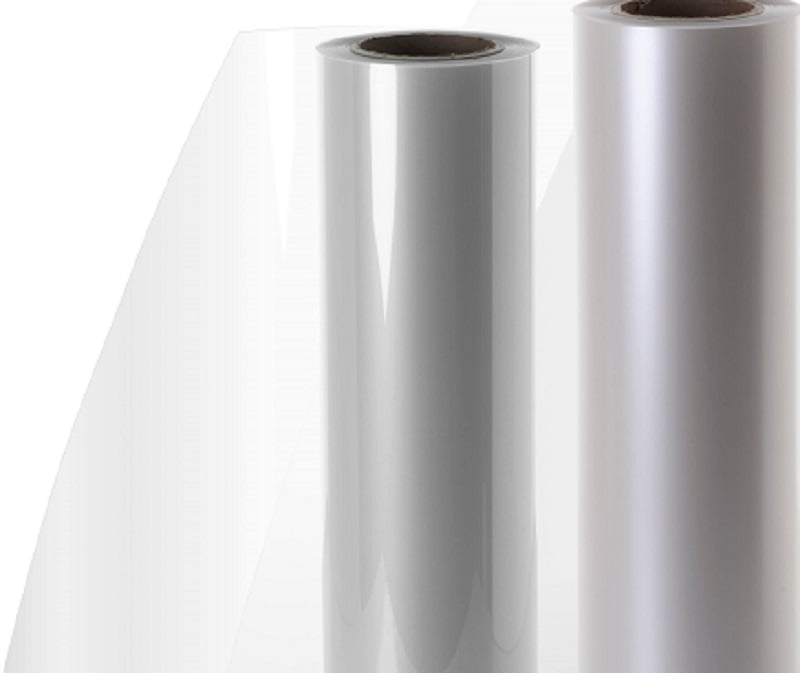
-A step closer to large-scale polystyrene circularity thanks to Sulzer Chemtech’s alliance with VTT
Sulzer Chemtech is strengthening its technology offering for chemical polymer recycling by joining forces with VTT Technical Research Centre of Finland. The exclusive collaboration will support the commercialization of comprehensive polystyrene (PS) recycling solutions at the core of circular economy strategies.
Sulzer Chemtech has signed a Memorandum of Understanding (MoU) with VTT to advance the development and popularization of a fully integrated processing train that converts poorly recycled waste PS into high-purity styrene suitable to produce various grades of styrenic polymers. These will also include demanding food-related applications with stringent, low VOC (volatile organic compounds) requirements.
The system will rely on VTT’s patented pyrolysis-based depolymerization solution and Sulzer Chemtech’s SuReTM Styrene purification technology. PS manufacturers and recyclers will benefit in the near future from a complete setup to increase the range of feedstock material supported by their plants. This will ultimately enable them to improve their sustainability and product quality. Non-packaging plastics – Meltblown
Sulzer Chemtech, which supports VTT in the development of its innovative PS recycling technology, will act as the main licensor, providing full process solutions to customers. These include basic engineering services, supply of key equipment and skid-mounted modular units.
Jarmo Ropponen, Vice President of Industrial Chemistry at VTT, comments: “Sulzer Chemtech has an excellent track-record with projects aimed at driving circularity in the (bio)-polymer and plastic sectors. For VTT, Sulzer Chemtech is an ideal industrial partner to drive the global adoption of PS chemical recycling facilities. We look forward to working together to develop more sustainable plastics and bring positive change in the sector.”
Patrick Farquet, Head of Renewables and Bio-based Applications at Sulzer Chemtech, concludes: “We are excited to expand our licensed technology portfolio by integrating the VTT’s cutting-edge PS chemical recycling technology to further attest our commitment to sustainability.
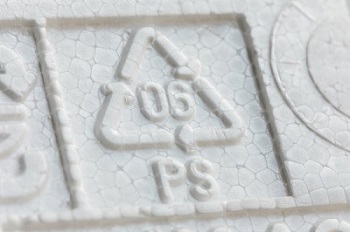
-Avgol to add new meltblown line at US site
Avgol has announced a significant investment in a new high-speed, high-capacity flexible multiple beam production line at its facility in Mocksville, USA.
“The addition of this new line enables us to have even greater production capacity, delivering component materials that are ‘Made in America’ and offering more sustainable options for the growing North America market and around the world,” said Avgol CEO Tommi Bjornman. “This additional new line also enables the Mocksville facility to deliver additional meltblown nonwovens, ensuring we have extra capacity to meet market demand. Non-packaging plastics – Meltblown
“Serving the growing baby diaper, adult incontinence and feminine hygiene markets along with satisfying sustained demand for meltblown filtration and medical materials, this investment enables Avgol to deliver an improved degree of service across the entire domestic region while consolidating and strengthening our existing position.”
Avgol, an Indorama Ventures Limited company, is a major supplier to the global hygiene market with comprehensive range of ultra-lightweight spun-melt nonwoven fabrics. This new, sixth line at the company’s facility in Mocksville will see Avgol investing in new Reicofil 5 (RF5) technology and underlines the company’s commitment to the region as a domestic supplier. The investment will deliver biocomponent and corresponding high-loft capabilities, with the line producing materials for applications that meet the needs of upper tier products for Hygiene customers.
As part of the investment, Avgol is also introducing extra capacity for meltblown production, ensuring a continuous supply of this critical material for both the region and customers worldwide.
Another aspect of the investment includes the addition of cutting-edge lamination capabilities, which enables Avgol to offer enhanced performance products into the existing markets the company serves, as well as to explore new opportunities in other markets.
“The RF5 line, meltblown line and lamination capabilities will provide us a powerful set of platforms as a base from which to provide high-value products for our customers,” added Bjornman. “It will enable us to further diversify the Avgol innovation portfolio while remaining true to our roots.” Non-packaging plastics – Meltblown
Bjornman also noted that the investment will also significantly support further sustainable product development in Avgol, under its innovative FIT (Forward Innovative Thinking) strategy. “Avgol is committed to the future of nonwoven fabrics with a particular focus on bringing polyolefins forward as viable resins in single use articles,” he said.
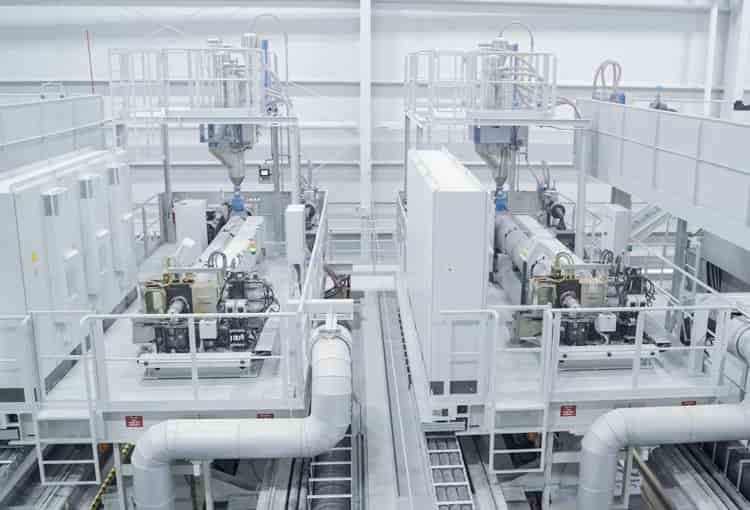
Non-packaging plastics – Meltblown
